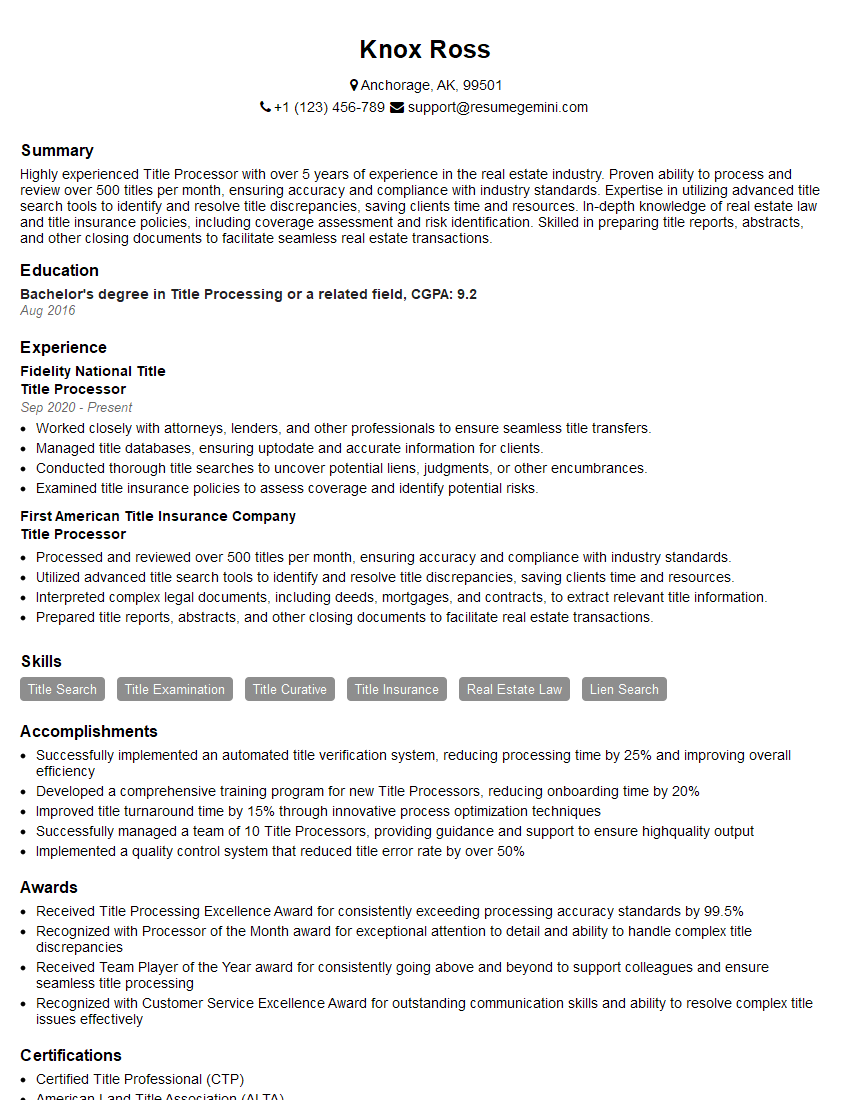Are you a seasoned Title Processor seeking a new career path? Discover our professionally built Title Processor Resume Template. This time-saving tool provides a solid foundation for your job search. Simply click “Edit Resume” to customize it with your unique experiences and achievements. Customize fonts and colors to match your personal style and increase your chances of landing your dream job. Explore more Resume Templates for additional options.

Knox Ross
Title Processor
Summary
Highly experienced Title Processor with over 5 years of experience in the real estate industry. Proven ability to process and review over 500 titles per month, ensuring accuracy and compliance with industry standards. Expertise in utilizing advanced title search tools to identify and resolve title discrepancies, saving clients time and resources. In-depth knowledge of real estate law and title insurance policies, including coverage assessment and risk identification. Skilled in preparing title reports, abstracts, and other closing documents to facilitate seamless real estate transactions.
Education
Bachelor’s degree in Title Processing or a related field
August 2016
Skills
- Title Search
- Title Examination
- Title Curative
- Title Insurance
- Real Estate Law
- Lien Search
Work Experience
Title Processor
- Worked closely with attorneys, lenders, and other professionals to ensure seamless title transfers.
- Managed title databases, ensuring uptodate and accurate information for clients.
- Conducted thorough title searches to uncover potential liens, judgments, or other encumbrances.
- Examined title insurance policies to assess coverage and identify potential risks.
Title Processor
- Processed and reviewed over 500 titles per month, ensuring accuracy and compliance with industry standards.
- Utilized advanced title search tools to identify and resolve title discrepancies, saving clients time and resources.
- Interpreted complex legal documents, including deeds, mortgages, and contracts, to extract relevant title information.
- Prepared title reports, abstracts, and other closing documents to facilitate real estate transactions.
Accomplishments
- Successfully implemented an automated title verification system, reducing processing time by 25% and improving overall efficiency
- Developed a comprehensive training program for new Title Processors, reducing onboarding time by 20%
- Improved title turnaround time by 15% through innovative process optimization techniques
- Successfully managed a team of 10 Title Processors, providing guidance and support to ensure highquality output
- Implemented a quality control system that reduced title error rate by over 50%
Awards
- Received Title Processing Excellence Award for consistently exceeding processing accuracy standards by 99.5%
- Recognized with Processor of the Month award for exceptional attention to detail and ability to handle complex title discrepancies
- Received Team Player of the Year award for consistently going above and beyond to support colleagues and ensure seamless title processing
- Recognized with Customer Service Excellence Award for outstanding communication skills and ability to resolve complex title issues effectively
Certificates
- Certified Title Professional (CTP)
- American Land Title Association (ALTA)
- National Association of Title Professionals (NATP)
- Certified Title Examiner (CTE)
Career Expert Tips:
- Select the ideal resume template to showcase your professional experience effectively.
- Master the art of resume writing to highlight your unique qualifications and achievements.
- Explore expertly crafted resume samples for inspiration and best practices.
- Build your best resume for free this new year with ResumeGemini. Enjoy exclusive discounts on ATS optimized resume templates.
How To Write Resume For Title Processor
- Highlight your experience in processing and reviewing a high volume of titles
- Demonstrate your expertise in utilizing advanced title search tools
- Showcase your knowledge of real estate law and title insurance policies
- Emphasize your ability to prepare clear and concise title reports and closing documents
- Provide specific examples of how you have saved clients time and money through your title processing skills
Essential Experience Highlights for a Strong Title Processor Resume
- Process and review titles, ensuring accuracy and compliance with industry standards
- Utilize advanced title search tools to identify and resolve title discrepancies
- Interpret complex legal documents, including deeds, mortgages, and contracts, to extract relevant title information
- Prepare title reports, abstracts, and other closing documents to facilitate real estate transactions
- Work closely with attorneys, lenders, and other professionals to ensure seamless title transfers
- Manage title databases, ensuring uptodate and accurate information for clients
- Conduct thorough title searches to uncover potential liens, judgments, or other encumbrances
Frequently Asked Questions (FAQ’s) For Title Processor
What are the key responsibilities of a Title Processor?
The key responsibilities of a Title Processor include processing and reviewing titles, utilizing advanced title search tools, interpreting complex legal documents, preparing title reports and closing documents, working with attorneys and lenders, managing title databases, and conducting thorough title searches.
What are the educational requirements for a Title Processor?
Most Title Processors have a bachelor’s degree in Title Processing or a related field. Some employers may also accept candidates with a high school diploma or equivalent and relevant experience.
What are the career prospects for a Title Processor?
Title Processors can advance their careers by becoming Title Examiners, Title Officers, or Title Managers. They may also choose to specialize in a particular area of title processing, such as commercial or residential titles.
What are the salary expectations for a Title Processor?
The salary expectations for a Title Processor vary depending on experience, location, and company size. According to Salary.com, the average salary for a Title Processor in the United States is around \$50,000 per year.
What are the essential skills for a Title Processor?
Essential skills for a Title Processor include attention to detail, accuracy, analytical thinking, problem-solving, and communication skills. They must also be proficient in using title search tools and software.
What is the difference between a Title Processor and a Title Examiner?
Title Processors typically handle the administrative tasks of title processing, such as data entry and document preparation. Title Examiners, on the other hand, are responsible for reviewing titles and identifying potential risks or defects.